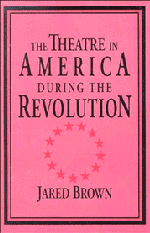8 - American Plays and Amusements, 1780–1782
Published online by Cambridge University Press: 29 September 2009
Summary
After several years during which the theatrical battleground was left entirely to the British military and their Tory sympathizers, American patriots began – tentatively, and in extremely small numbers – to participate in plays and theatrically oriented social entertainments once again in 1780.
Reading, 1781
In 1781, an American soldier, Lieutenant Enos Reeves, was stationed at Reading, Pennsylvania, where British prisoners of war were being held. American officers gave a series of theatrical performances in Reading, some of which Reeves recorded in his letter-books. His initial notation occurs in a mutilated letter, the first section of which is lost. The letter, dated “Septr. 1781,” gives a partial cast list for a performance of The Lying Valet. Reeves's name is not included, but he was evidently cast in the play, for he remarked:
We were as busy as possible and as assiduous as if we expected to make a living by it, so eager are all men for Applause, that we cannot think of being excelled even in the character of a player. The task is so severe on me that I believe I shall give it up for the future, but the parts I have had, have been exceeding long, and mostly the person in trouble, which affects me almost as much as if it was real.
Reeves's letter indicates that the women's roles were acted by American officers: He identified the character of Mrs. Tippet as having been played by Doctor Allison.
- Type
- Chapter
- Information
- The Theatre in America during the Revolution , pp. 135 - 144Publisher: Cambridge University PressPrint publication year: 1995



